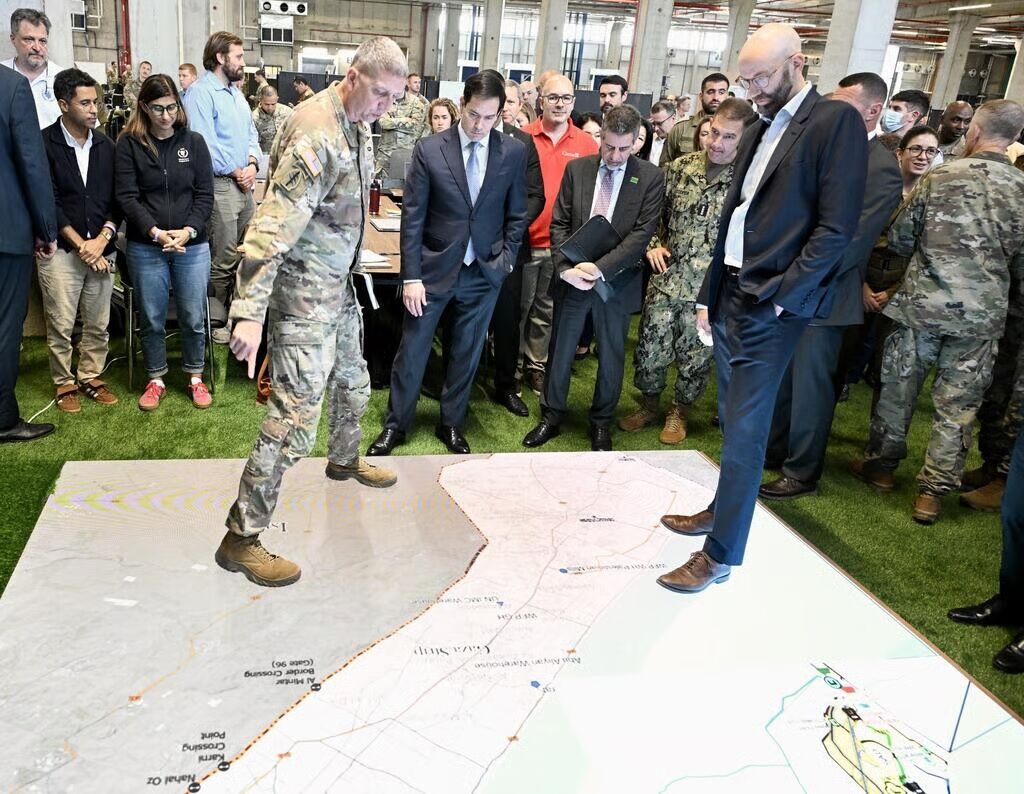Alwaght- While the Netanyahu government with its ongoing strikes on Gaza and obstruction of the Gaza aid entry is grossly violating the first stage of the ceasefire with Hamas resistance movement, the guarantors of the truce, closing their eyes to these Israeli violations, are pushing for implementation of the second stage with deployment of International Military Committee in Gaza as their central plan.
Axios reported that the US has started a motion in the UN Security Council with the aim of forming an international force with wide powers in Gaza. Washington has sent the draft resolution to a number of UNSC members to debate this force.
This draft proposal grants the US and participating countries sweeping powers to administer Gaza and ensure its security. The resolution also calls for an entity known as the "Peace Council" to remain in Gaza at least until the end of 2027.
The document states that an international force will be responsible for securing Gaza's borders with Israel and Egypt, protecting civilians, and guaranteeing the flow of humanitarian transit. Its other duties include destroying and preventing the rebuilding of military infrastructure, disarming factions, and training a Palestinian police force that will partner with it on its mission.
Furthermore, according to the draft resolution, Israeli military forces will take on additional tasks for what has been declared "support for the ceasefire agreement."
Fox News, citing US Director of National Intelligence Tulsi Gabbard, reported that 16 countries and 20 government agencies are participating in a multinational force in Gaza.
These claims come amid significant disagreement between resistance groups and foreign parties over the very nature of such a force in Gaza. Most Gazans and resistance groups maintain that while the plan is ostensibly for supporting peace, security, and a lasting ceasefire, in practice, it could become a tool for foreign actors to exert political and security control over the coastal enclave.
Leaders of resistance groups had earlier openly expressed their opposition to any international force in Gaza. In the eyes of the Palestinians, decisions on the political and security structures of Gaza should not be given to the foreign actors and only home Palestinian groups should have the right to determine the policies and administer the vital affairs of people in Gaza in order to maintain independence and legitimacy of decision-making.
Furthermore, the stances of the Israeli cabinet are not aligned with the US and West and even it has come against them. Israelis argue that such a mechanism will restrict their freedom of action to advance their future plans.
Tel Aviv's big barrier ahead of the International Military Committee
While the details of this resolution, as usual, appear to be designed in favor of the Israeli regime, Israel itself considers the deployment of any international force in Gaza to be contrary to its security policies. According to a report on Monday from the Israeli regime's state broadcasting network, Washington's push to accelerate the formation of a multinational force in Gaza is fueling a growing dispute within Benjamin Netanyahu's cabinet.
The report states that Netanyahu's cabinet opposes the creation of an international force under a UN Security Council resolution, or the participation of Turkish armed forces in such an international force.
Israeli regime is deeply suspicious of such a force's presence and is unwilling to see a mission similar to UNIFIL in Lebanon take shape in Gaza. From Tel Aviv's perspective, deploying neutral forces in an area it considers a "vital security zone" would mean restricting the Israeli army's freedom of operation, increasing international scrutiny of its military actions, incurring greater international legal costs and burdens, and limiting the regime's ability to directly manage on-the-ground and political developments, such as advancing its plan to relocate Gaza's population after the war.
Furthermore, Tel Aviv views this move not merely as interference in its internal security affairs, but as a step towards the indirect political legitimization of Hamas, especially if the movement's political wing were to participate within an international civilian committee.
Additionally, Tel Aviv leaders are afraid that presence of international forces can make the world public opinion more sensitive to the actions of the Israeli military and raise the chance of documenting its crimes against the Palestinians and putting pressure on Tel Aviv internationally.
On the other hand, while the composition of the potential international force remains undecided, speculation about the participation of countries like Turkey and Egypt is expected to face firm opposition from Tel Aviv. The involvement of these two nations could shift the political and security balance in Gaza against Israel's favor.
Turkey, with its critical stance toward Israeli policies and overt support for the Palestinian cause, would likely use its operational decision-making power to strengthen Palestinian interests. Similarly, Egypt's participation, as Gaza's southern neighbor and the traditional authority over the Rafah crossing, would grant it a pivotal role in managing humanitarian, security, and logistical affairs.
Therefore, for the Palestinians, the inclusion of these countries in international structures would mean enhanced political legitimacy and reduced reliance on mechanisms controlled by Israel. Conversely, from the perspective of the Israeli regime, this very composition of forces within an international committee represents a threat to its direct security and intelligence control over Gaza.
Dim outlook of multinational force
Despite the US push to present itself as a peace mediator in the occupied territories, success of its plan for multinational force in Gaza depends on a set of factors.
Achieving political consensus among key actors, determining a transparent mission, providing sustainable funding, and developing a true will for peace plan implementation are the most important drivers of success of this initiative. Should each of these favors be missing, the plan would be highly likely to fail.
The historical record of international missions in conflict zones, particularly given the repeated ceasefire violations by the Israeli regime, shows that without a durable agreement between the warring parties, peacekeeping forces often devolve into symbolic and ineffective entities. The UNIFIL forces in Lebanon are a prime example. Despite their clear mandate, the Israeli military has repeatedly targeted their positions over the past two years and has violated the ceasefire 9,400 times since it was agreed in February. This record fundamentally bankers their efficiency in doubt.
Given this failed precedent, the situation in Gaza is poised to be even more complex. Israeli military forces will maintain direct oversight of the ceasefire process, a position that could effectively neuter the international force's core objectives.
Thus, the mission's potential for failure is high, undermined by the occupying regime's explicit opposition, resistance groups' deep skepticism about the force's neutrality, and the lack of a comprehensive plan to lift the blockade.
Furthermore, since a primary goal of the international force is the disarmament of resistance groups, which would render Gaza defenseless, the American plan is unlikely to prove sustainable if implemented. In practice, this force could serve as a pretext for the continued presence of Israeli troops, who would operate under the guise of "supporting the international mission" to maintain their occupation and direct control over Gaza. While the central demand of Palestinians is the complete withdrawal of occupation forces, Washington's draft resolution leaves the path of occupation wide open.
Accordingly, Israeli Foreign Minister Gideon Sa'ar and Energy Minister Eli Cohen in their latest comments claimed that destruction of Hamas is part of Trump's plan and they try to realize this objective by returning to the war.
The hardline ministers' positions make it clear they will not permit any committee outside Israeli control to govern Gaza. Consequently, Washington's proposed initiative will likely remain a mere publicity stunt, never reaching actual implementation.
The Israeli regime's repeated violations of ceasefires and international law demonstrate its capacity to resume military operations and the killing of civilians under new pretexts. Therefore, the American initiative appears less likely to achieve genuine peace and more likely to facilitate the perpetuation of the crisis and the consolidation of the occupation.
All in all, deployment of an international military force to Gaza will be successful only when, instead of temporarily managing the crisis, it focuses on a fundamental solution, end of blockade, and real guarantee to the rights of the Palestinian people, something that, given the current conditions, is an unachievable aspiration rather than close to realization.



























